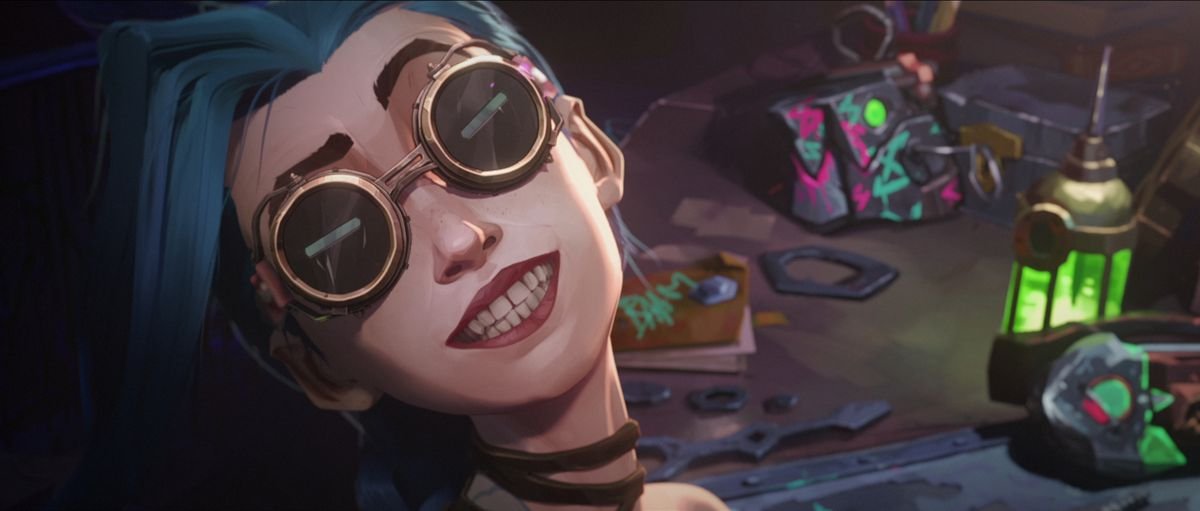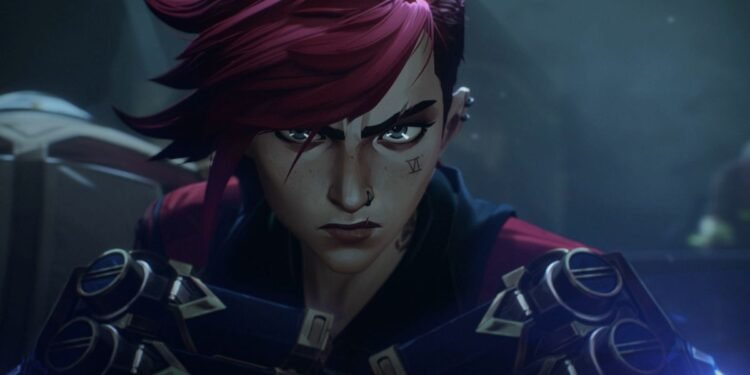I can’t overstate my disinterest in playing League of Legends. As far as hobbies go, it seems far too stressful, and I do not have five friends. I will probably never play League of Legends, and that’s OK. However Arcane: League of Legends, the animated series that just wrapped its first season on Netflix? Devoured it in a weekend, and you should too.
Ahead of Arcane’s premiere, our premiere review noted that it is, essentially, extremely good YA fiction. This is the perfect way to approach the show. Like so much of YA fiction, Arcane is a story about very hot people wrecking their relationships and their own lives in ways that feel hopelessly inevitable. What makes it so compelling over the course of its now complete first season is that its characters and their passions — for each other, for fulfillment, for revenge — are what everything else stems from. It’s not a show that’s particularly concerned with world-building by way of exposition, the way so much fantasy is. Rather, it shows characters building the world — and breaking it.
Relationships drive everything in Arcane. It’s first and primarily about sisters Vi (Hailee Steinfeld) and Powder (Ella Purnell), who, across a trio of three-episode acts, grow up together as sisters orphaned by war, are separated as young adults, and become bitter, perhaps irrevocable adversaries as they enter adulthood and Powder, under the sway of a cunning slumlord, becomes the mad genius killing machine Jinx. (A lady Joker, if you will.)
Around them, the world changes. While Vi and Powder are denizens of “The Undercity,” they’re also painfully aware of their monied counterparts in Piltover, the “City of Progress” where the show’s other central pair live: Jayce (Kevin Alejandro) and Viktor (Harry Lloyd), two idealistic scientists who find each other in a moment of darkness and together, lead Piltover to even greater heights thanks to their invention of “Hextech” (i.e., magic, but also technology).

Unlike Vi and Powder, Jayce and Viktor are a Have and Have-Not pairing, as Viktor is from the Undercity. Their success doesn’t corrupt either of them necessarily — Arcane’s writers are interested in complicated people, not good or evil people — but it does compromise each of them in painful ways. Viktor wants to help the people being left behind in the Undercity, and Jayce wants to do the most good possible the right way, and both make terrible choices that have dire consequences for their relationship and the world of Arcane.
This is very intro-to-screenwriting stuff, but in the streaming era, TV dramas have taken on a largesse that often translates to narrative lethargy. Events take their time to occur, and can often feel like they’re happening to characters, instead of characters making things happen. In Arcane, characters are constantly making things happen, and what makes it delicious is that it’s never on purpose, and the results are almost never what they want them to be. Arcane’s first act ends with the event that effectively determines and foreshadows everything coming over the next six episodes in ways no one anticipates. Vi tells her little sister Powder to stay home while she and her friends go to rescue their surrogate father Vander. When Powder goes anyway, she decides to help by improvising a magical bomb, cleverly foreshadowing the invention of Hextech, and its eventual pivot from industrial wonder to weapon of war. The bomb kills almost all of their friends, fracturing Powder’s psyche and separating her from her sister. It’s over here, six hours before we ever see it happen. Powder shatters her whole world, and unwittingly with a crude version of the same weapons that will wreak havoc across the entire city around her.

Image: Netflix
A big reason this all lands so hard is thanks to the tremendous animation from Riot Games and Paris-based Fortiche, which leaves every frame brimming with venues for characterization, as body language, facial expressions, and fight choreography are all painstakingly presented and beautifully realized. It is probably worth noting that while Arcane is an unapologetic video game adaptation, it does not traffic in the typical signifiers of games culture. Most obviously, it’s a story about women with great care taken to make its cast diverse and interesting. But outside of the League of Legends subtitle, the markers of “game adaptation” are spare. It does not indulge in cartoonish and weightless action — it’s fights are all tremendously stylish, well-choreographed, and meaningful. Characters don’t just walk away from fights in Arcane bloody — if they walk away at all, they walk away different.
While I am positive Arcane is constantly bandying about references and Easter Eggs to League of Legends and its many spin-offs, they’re all entirely lost on me. Yet I’m never left feeling adrift because the show is building its own identity: Visually, narratively, and most surprisingly, musically. Imagine Dragons does the show’s theme song, and while this is one thing I have no problem making fun of Arcane for, it says something about the show’s interest in participating in the wider culture, and not merely demanding its attention the way many video game ventures do. Music permeates Arcane, and it’s all of a CW-hip sensibility: tender verses, electropop synths, fight-song choruses, and chest-thumping hip-hop. Artists like BONES UK and Pusha T to get your blood really going, and also to make Arcane feel much less…arcane.
Big-budget video games are like an island; even if there are many people hopping back and forth between them and “mainstream” culture, there’s often little in the way of cultural exchange. Visitors enjoy their time among the denizens of Video Games Island, or perhaps even relocate there, but there is still an otherness to it all; makers provide the Island, the merch, and various ephemera, but aren’t interested in much else. An awareness that culture is being shared en masse at a greater volume elsewhere. As a show made by Riot Games, one of the biggest players on Video Game Island, Arcane may be one of the most significant attempts at bridging the distance, at making games less of an island — bringing the show where everyone watches them, on Netflix. Even if it ultimately isn’t that bridge, it’s still an excellent TV show, which is a wonderful thing to be.
























































